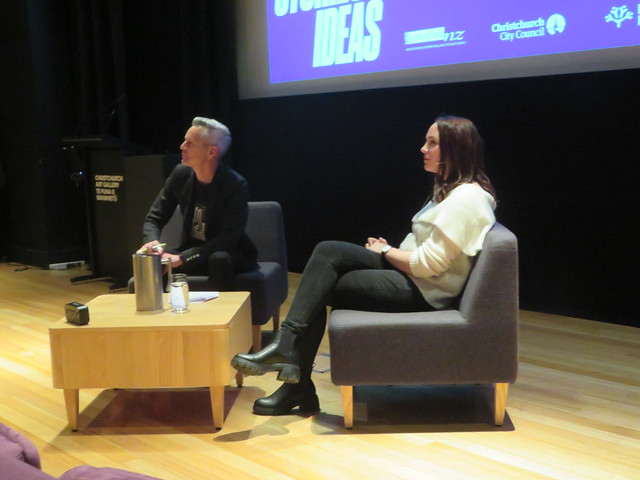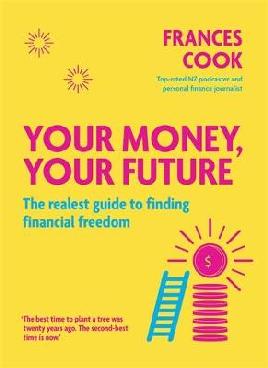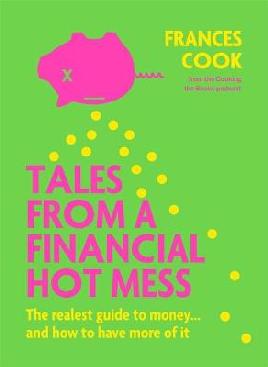The crowd that fills the Philip Carter Auditorium for this event at the Christchurch Art Gallery is noticeably younger than others I've been part of at WORD this year. Sure, there are a few snowy heads but it's mostly people in their 30s and 40s from what I can tell. I have a theory that these might be listeners of Frances Cook's popular podcast come to see her in person. I'm also aware that Cook is very active on social media so it would make sense that she'd draw a younger (by literary festival standards) crowd.
Over the course of the hour Guyon Espiner will draw her into discussions about our relationship with money and how we can be smarter about how we grow our wealth. At certain points it seems like he's asking for tips for himself and not just on behalf of the audience. I have to admit, if I had a financial expert to hand I'd probably do that too.
Money feelings
I'm pleasantly surprised at how much focus Cook has on the emotive aspects of money. The obvious emotion to associate with it is greed, but often shame and guilt play a large part in how we relate to money and advice that purports to help actual humans will need to grapple with the emotional as much as the mathematical. As Cook points out at one point, it's not the maths that trips people up - the maths is the easy part, it's how spending money and buying things makes us feel.
Espiner suggests that we don't pay as much attention to our money as we should because there's an idea that do so would make us greedy or shallow. Cook thinks that beliefs like this do sometimes hold people back but money, she says, doesn't change people - however it does amplify who you are (and the effect that you can have - I immediately think of "cartoon rich person" Donald Trump). And caring about money is valid, "...everything that matters in life takes money..." like building a fulfilling, stable life.
Cook is also of the belief that "anyone can make their life financially better". How long that takes will depend on where you're starting from.
One simple trick for a comfortable retirement
Espiner asks her to talk about a financial principle around retirement savings that I suspect must be from her book, Your money, your future, "The 25 number".
Right. Numbers. This might be where my mathematically challenged self stops following, but actually the way Cook explains it I am able to grasp it. Yay!
The idea is you look at how much your life is costing then multiply it by 25 - that's your "freedom number". Everybody's will look different. Some people are happy to live quite frugally, others will want a more extravagant lifestyle. Deciding what's important to you in terms of your spending is an important part of the process.
Whatever your number is, you can invest that money in index funds and you can take 4% out as your living costs every year and because index funds are a safe investment (they have failed only 2 out of the last 200 years) that grow at the same rate as that 4% you're taking out, "you will never run out of that nest egg". For example, if you've determined that $40,000 is your amount you need, times by 25 is 1 million dollars. It sounds a lot but having the goal amount in mind is the first necessary step to achieving it, I guess?
Cook encourages people to keep a money diary for at least a week (or for a month if you can manage it) to keep track of:
- How much you spend
- How much you needed to spend
- How happy it made you
She thinks that pretty much everyone can identify something in their spending that they didn't really need to purchase. Answering these questions will help you establish what your spending should actually be.
Spending cash or not spending it
Espiner wants to know - does Cook advocate using cash instead of cards to pay for things?
Cook says that for a lot of people paying by cash works better because you're able to directly see how much money you're spending and it is more effective at activating the "pain" parts of your brain. Interestingly, it also activates the reward centre of your brain too, so you'll be happier with the purchases you actually want. As someone who rarely has cash on them, this is a fascinating piece of information to me.
Cook says that 60% of people's costs an incurred by housing/transport/food and a really effective way you can make a dent in this is by reducing the amount of cars your household uses. Cars are the ultimate depreciating asset and have a lot of associated costs that make them quite expensive. If getting rid of the car entirely isn't realistic, even using it less can be a good option.
Cook also suggests trying to do occasional "cash-free weekends". This might require being a bit more intentional about how you choose your activities. Instead of defaulting to "catching up for a coffee" consider organising a pot-luck dinner or meeting up with a friend for a walk in the park. It isn't necessarily that easy to break the habit of going to movies or out to lunch but it's a muscle that you can strengthen and if you do it a lot that low cost walk in the park might become the default. Might I suggest the Library as another low cost hangout?
Things like "cash-free weekends" or even whole weeks if you're committed are a form of "financial fasting" and Cook says that for some people "intense restriction" then back to normal life, little "sprints" of saving, are easier than constant adherence to a budget.
Is a university education a good investment?
Espiner questions her on the cost of education and Cook feels that a university education straight out of high school is not necessarily the best path (she personally feels she would have benefitted from a gap year), that this sometimes results in people spending "tens of thousands of dollars on 'finding themselves'":
Study something you enjoy and a job will turn up - it's such a lie.
Your education is a big investment so there should be a pay-off. Upskilling later in your career is very dependent on the cooperation and support of your employer.
Do tradies earn more than university grads, Espiner wants to know? Bad news for uni-folk. Yes, they do. For a few reasons including that uni grads can be 3, 4, or 5 years behind tradies in terms of when they start earning, though things do start to level up at around the age of 60.
Okay, but what about "side-hustles"?
Cook is of the opinion that you shouldn't have to have a full-time job AND a part-time job. Calling a "side-hustle" a part-time job does definitely remove some of the glamour. Cook thinks there are seasons in your life when picking up extra work will have benefits BUT it's not sustainable in the long run and you will burn out.
The Share Market vs Property Market
Who, wonders Espiner, are better at investing - women or men? Cook is at pains to point out that she's about to make a broad generalisation but... women are. Fewer women invest but those that do, do better because they do their research, have a clear strategy and are happy to "set and forget" meaning they don't feel the need to tinker and be reactive to fluctuations, whereas men (including her husband, she reveals later) are more likely to make changes that they feel will optimise their returns but which very rarely have that effect.
But isn't the share market risky? Cook points out that it's more regulated than it was in 1987 and historically nothing has performed better. Unfortunately, in New Zealand investing in property is incentivised but she points out that one thing in favour of investing in shares is that houses don't employ anyone or make anything, which is a fair point. Compounding the problem is that banks are incentivised more towards home lending than small business loans. Cook herself wouldn't want to invest in property at this point as it would feel unethical.
Espiner asks a question that probably a few people are wondering - is it better to pay extra money onto your mortgage or invest it?
Cook's answer is that on pure numbers it will always be best to pay off the mortgage. However, many people, once they get near to the end of their mortgage end up borrowing more on it, taking on more debt for upgrades, a pool, or whatever so splitting your "future building money" and doing a bit of both is is a good way of building redundancy into the system.
Cook has mentioned index funds multiple times so Espiner asks for an explanation of what those actually are. Index funds follow a particular Index (think of a ranked listing of companies) and will automatically drop any shares that fall out of the top 50, 500 or whatever the scope of the Index is. It can be spread across 100s or 1000s of companies. It's the opposite of an Active Fund (guys in suits who you pay for their "special knowledge" that can "beat the market"). They do sometimes beat the market but once you take out their fees it's not really worth it. At the discussion of fees, Cook points out that Kiwisaver fees are usually more significant than people realise and do not represent 1% or 2% of the profit, but of the total amount you have.
Espiner then asks about the Rule of 100. This is to do with investment strategy and time. Cook says the younger you are the more aggressive you can be. If you're 20 then 80% of your money can be in higher risk investments, with 20% in safer bonds or term deposits. It's just a starting point that simplifies things.
Financial independence and money in relationships
If you're interested in growing your wealth with the goal of being financially independent Cook says that there are very supportive online communities around this concept of FIRE (Financial Independence Retire Early). It's about achieving freedom on your terms and is very non-judgemental.
Money in relationships is a big one and a cause of much tension. Does Cook advocated for separate bank accounts. She says that works for her and her husband though she points out they also have shared accounts and keep each other in the loop with where they're at financially.
Cook feels that some people just believe they're bad with money but she doesn't accept this:
If you were never taught to swim it wouldn't mean you were dumb.
Which segues nicely into a discussion of financial literacy education. Cook feels that even if you make this available to teenagers it's not really going to stick until they have their own money, as in when they get their first job. She feels that learning about this stuff doesn't have to be this big overwhelming thing - it's perfectly fine to just learn what you need to know now. Picking things up in bite-size chunks can make it easier and that's what she does alot with social media, on Instagram for instance.
Instagram is fine but should we pay someone for financial advice? Cook says this can make a big difference for some people but recommends finding someone you can pay up front (not someone who will take a percentage from profits) and a red flag is someone who talks down to you.
Audience questions
The audience has come with questions and though Cook makes the disclaimer that she is not offering financial advice what follows is advice... in the area of finance.
Someone from the US asks how they can make it easier to deal with tax issues as there's an extra layer of complexity. Cook acknowledges that the US makes it really difficult for citizens living overseas so hiring a professional to help with that is a good idea. She suggests meeting with 3 different people (who should offer a first meeting for free) with the goal of them helping to set up a plan that they can then self-manage.
Are there any other podcasts that Cook recommends?
- She's on the Money is an Australia podcast (so not everything is relevant to NZ) and it includes a lot of personal stories
- Afford Anything is focused on hardcore financial independence movement (in the US)
How do people invest in shares?
- Sharesies used to be good but they've put their fees up so are now probably best if you've got a big lump to invest.
- Kernel is a good low cost provider for Index funds
- Stake is an option if you only want US funds.
Is there a minimum amount? Cooks says $1 a week is better than zero a week. Even a small amount can be good in terms of the mindset of being able to say "I am an investor".
How can we get financial literacy education. Cook loves that people are starting to talk more about money. It needs to be part of normal conversation. She thinks that people have felt like they either needed to know everything or say nothing.
An audience member asks about talking to your parents as they near retirement. His parents have very different views to him about how they should be dealing with this. How do you teach your parents about money.
As has become the established pattern Cooks shows herself to be a smart observer of human nature, pointing out that with parents it's tricky due to the power dynamic - it's likely to be emotionally loaded. There is no easy answer but talking about what's going on for you so the door is open for further conversations that might evolve over time is a good idea. Unfortunately, she says, "a lot of kids rae their parents' retirement plan".
How does she keep her social media posts fresh so that she's saying something new, given that the basic principles are always true? Sometimes, she says, she's just repackaging something from a year ago.
Even if I've said something 100 times someone will be hearing it for the first time.
She's also endeavouring to bring more personal stories into her podcast, focusing on the human side or an angle that makes it relatable to people.
What does she thing about Girl Maths? This has been coming up a bit recently and is basically women coming up with silly maths that justifies an unnecessary purchase. On the one hand, Cook doesn't love that it's reinforcing problematic stereotypes (men tend to spend more on "silly" purchases) and pushes against the idea that every purchase must be "good and worthy". But maybe it's a good launching off point for further conversations. Did you know that in the territory of luxury handbags "Hermes bags are the best return on investment"?
It's not unusual for me to walk out of a WORD event feeling a little bit smarter, but in this case there was actual maths involved and it still ended up being true!
Find out more
- WORD Christchurch website and 2023 programme
- Follow @WORDChCh on Twitter
- Follow WORDchch on Instagram
- Like WORD Christchurch on Facebook
- Our WORD Christchurch 2023 page






Add a comment to: WORD Christchurch 2023: Cooking the books